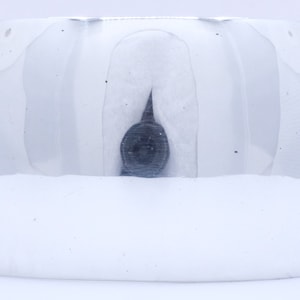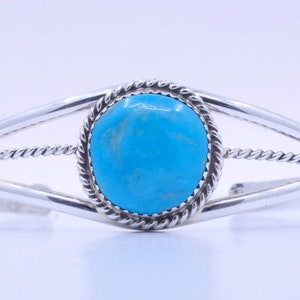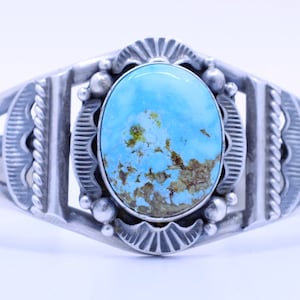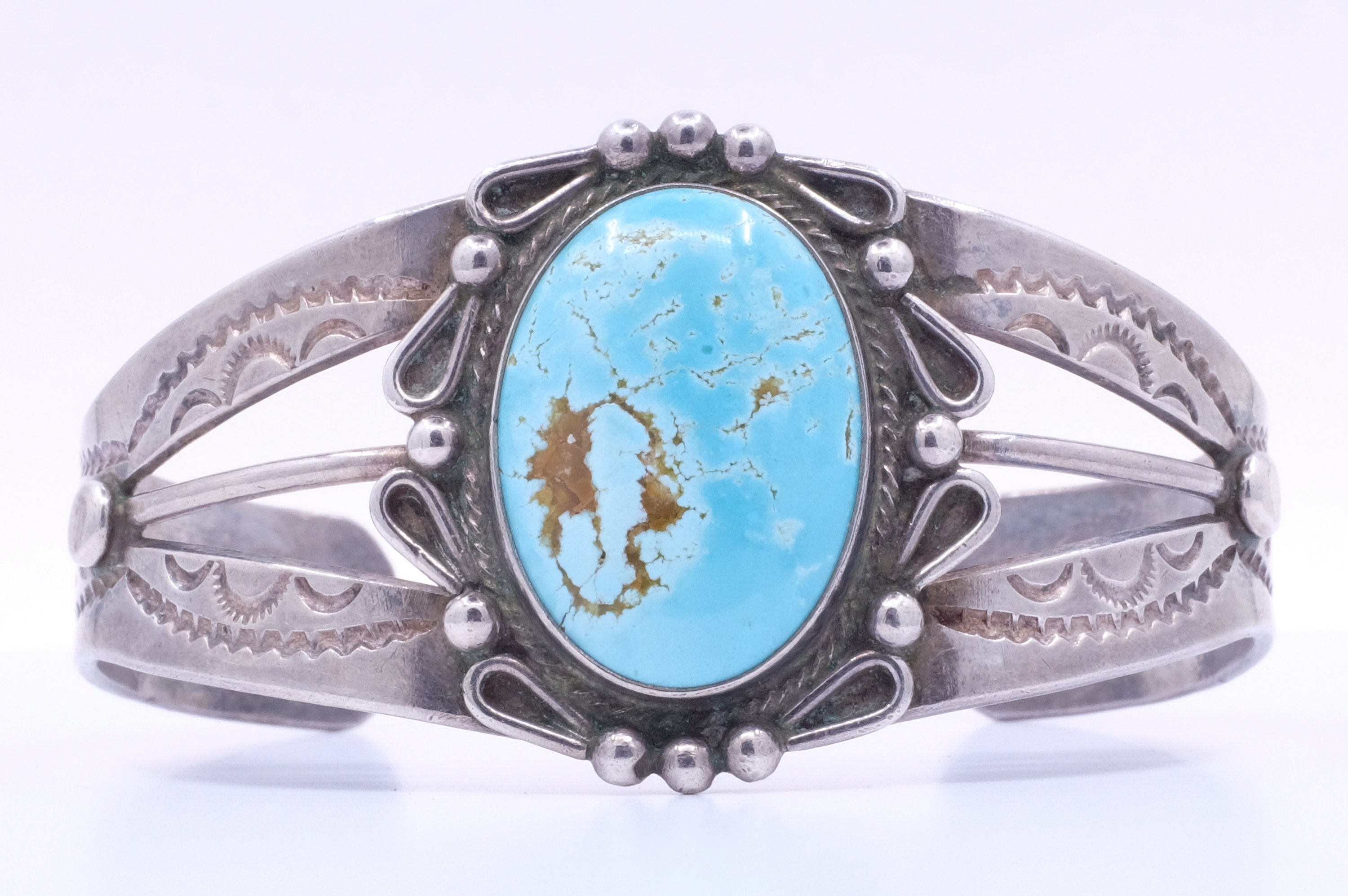
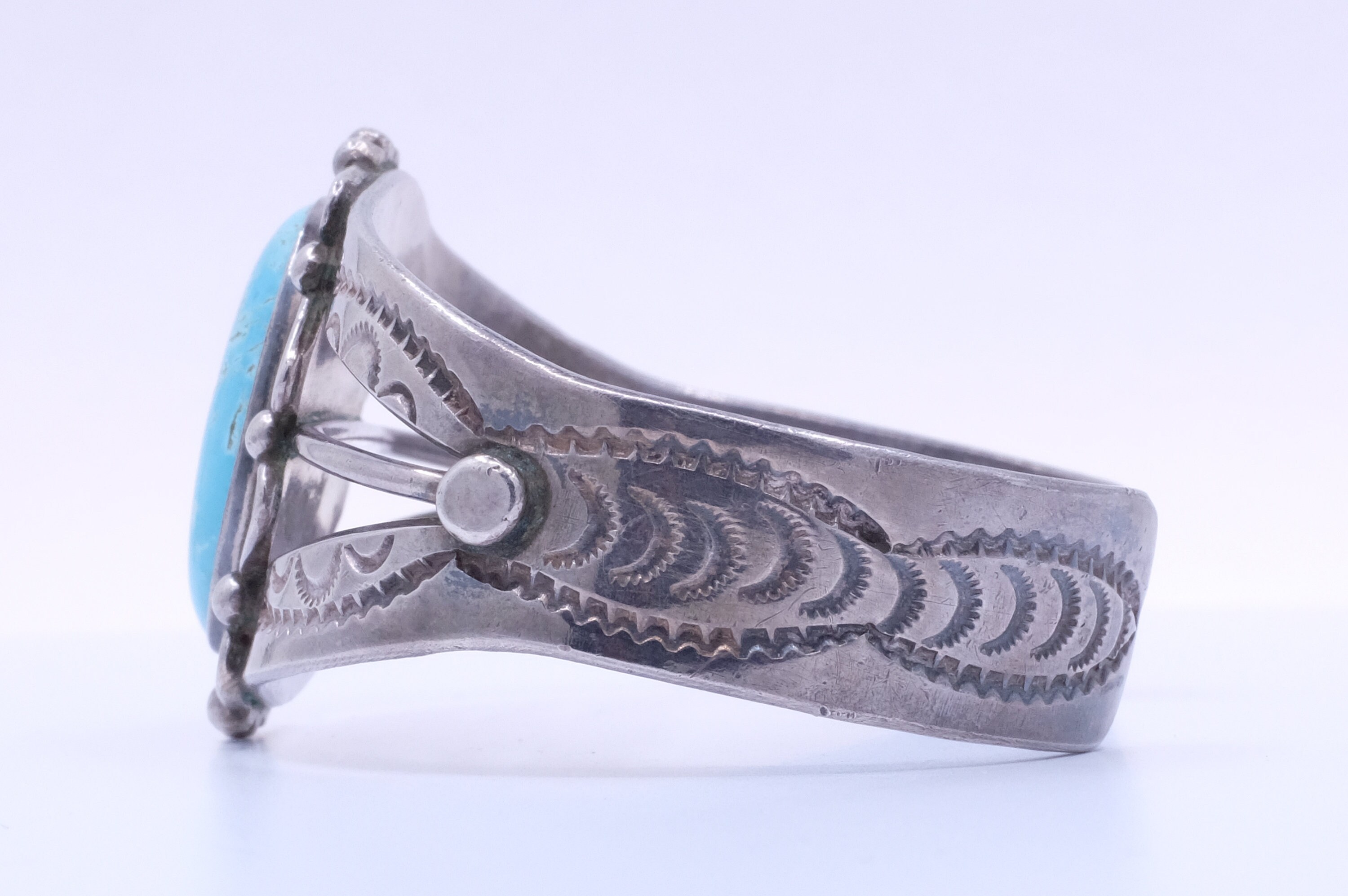
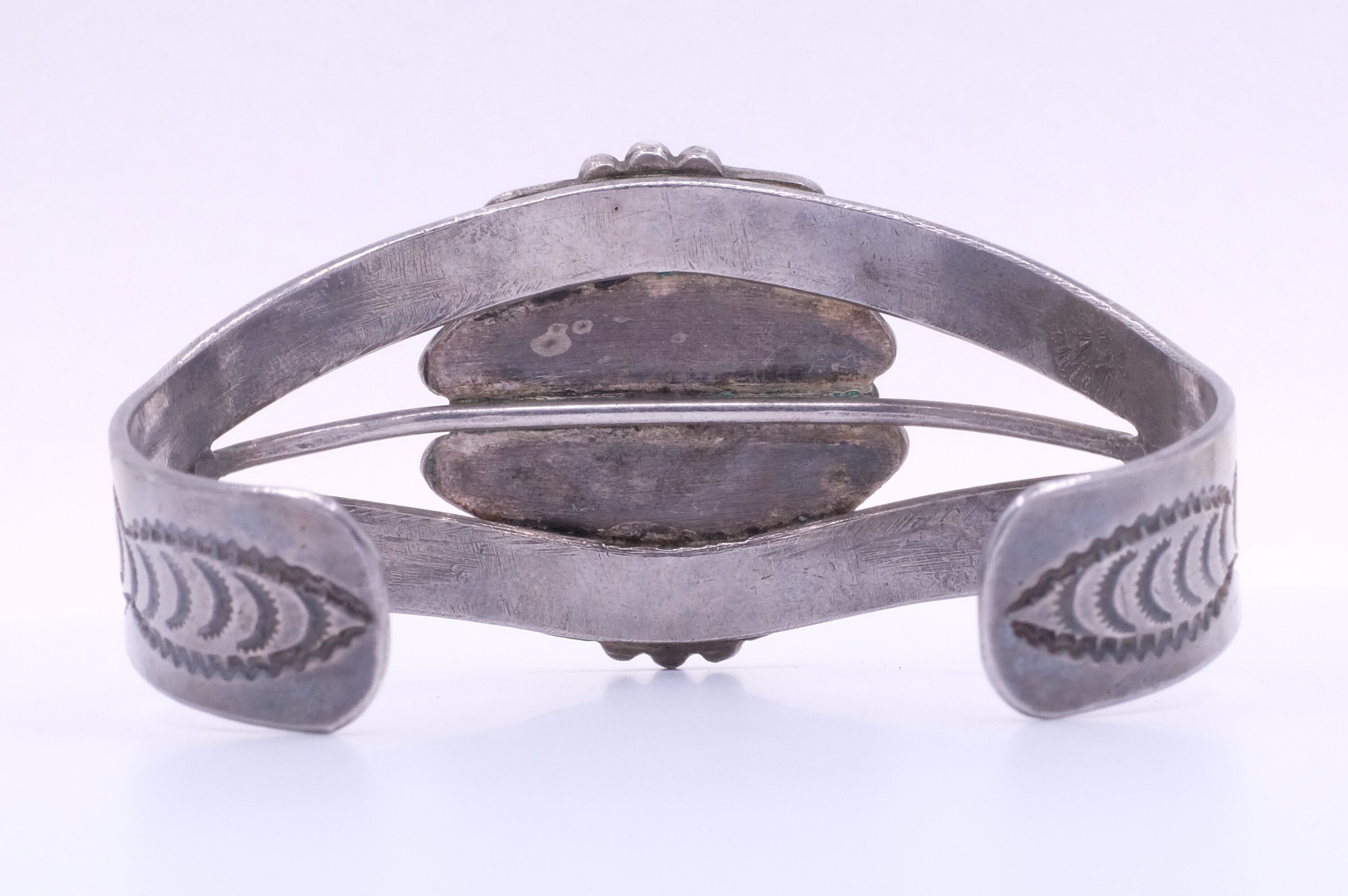
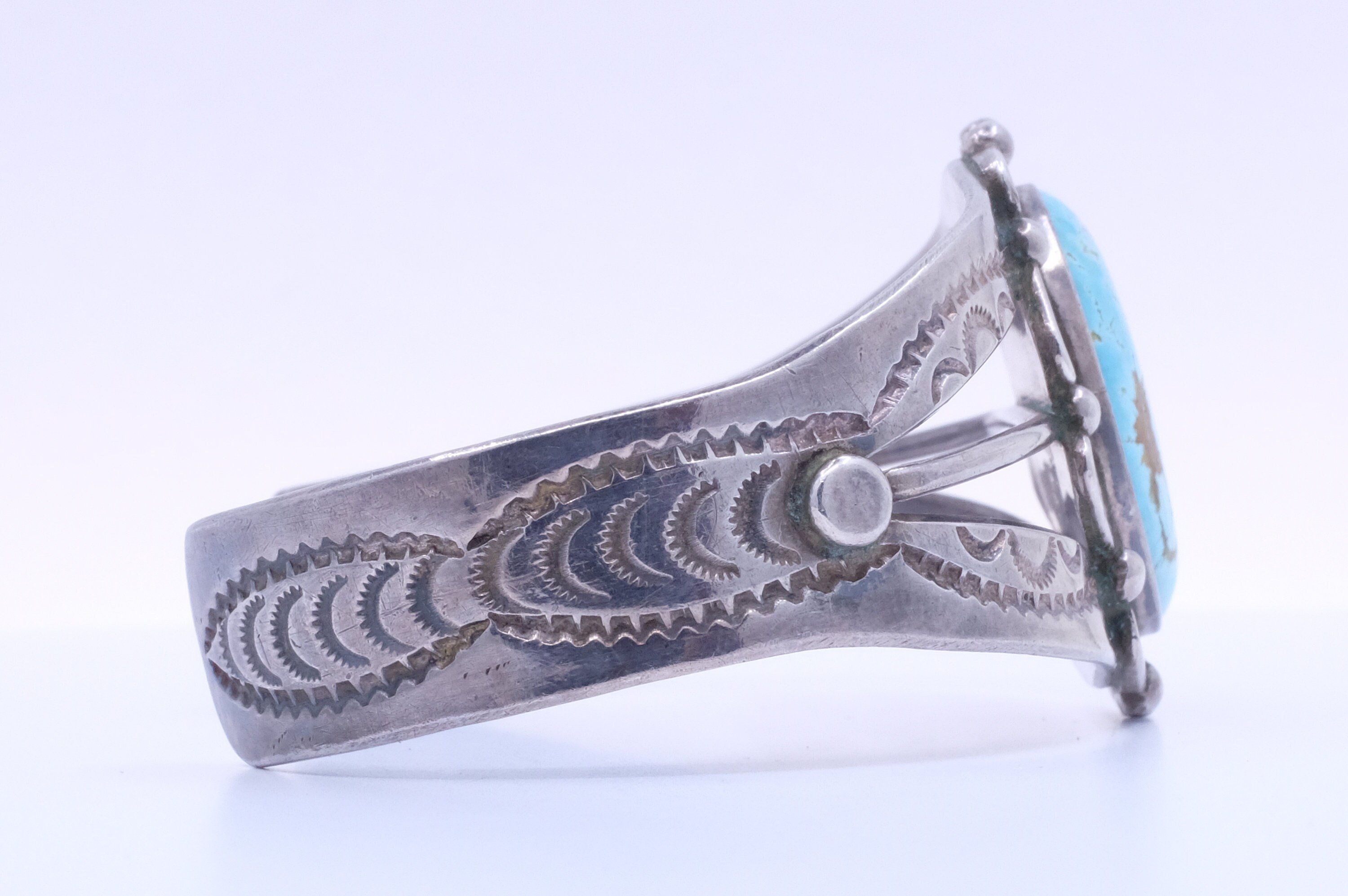
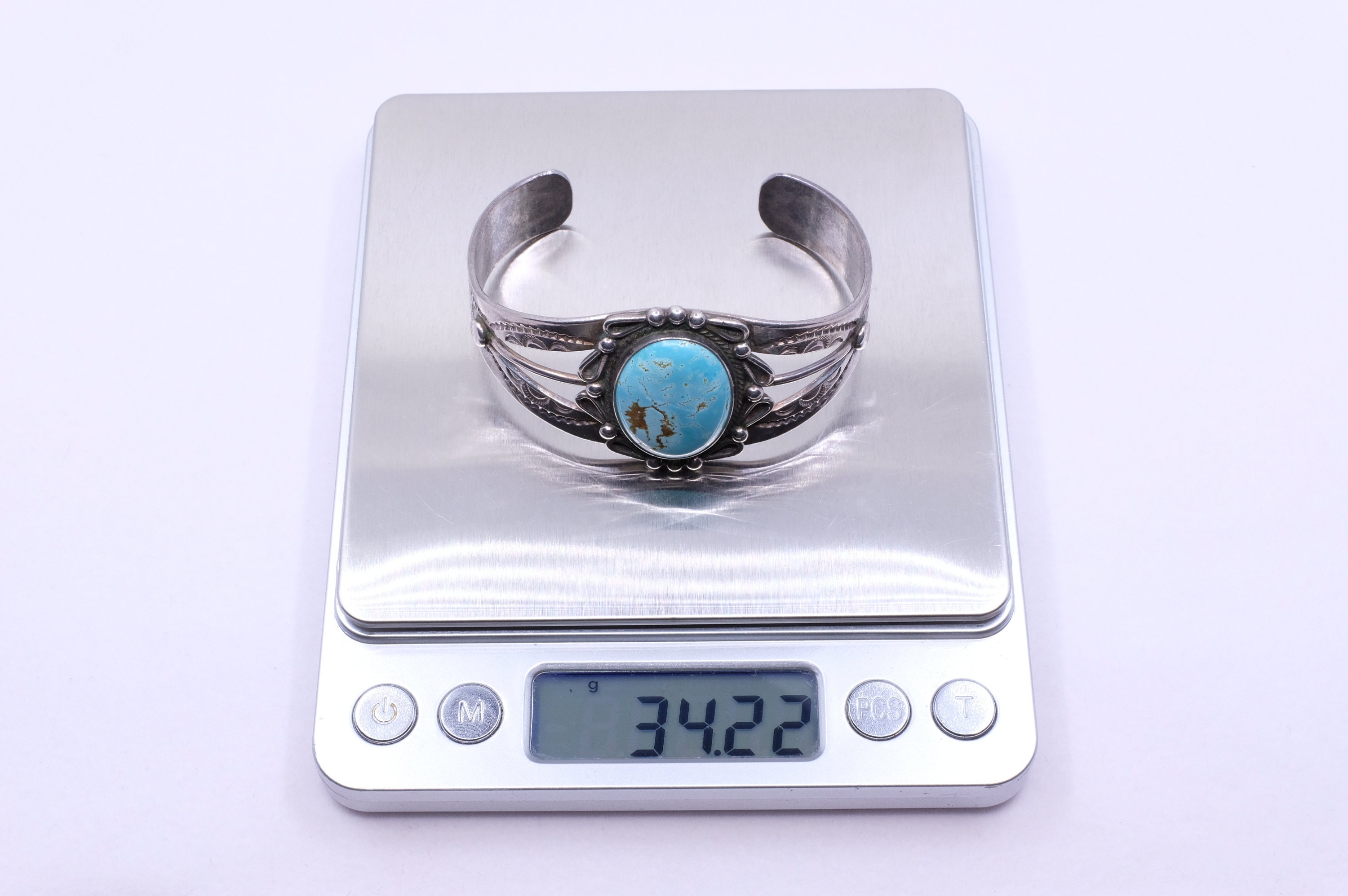
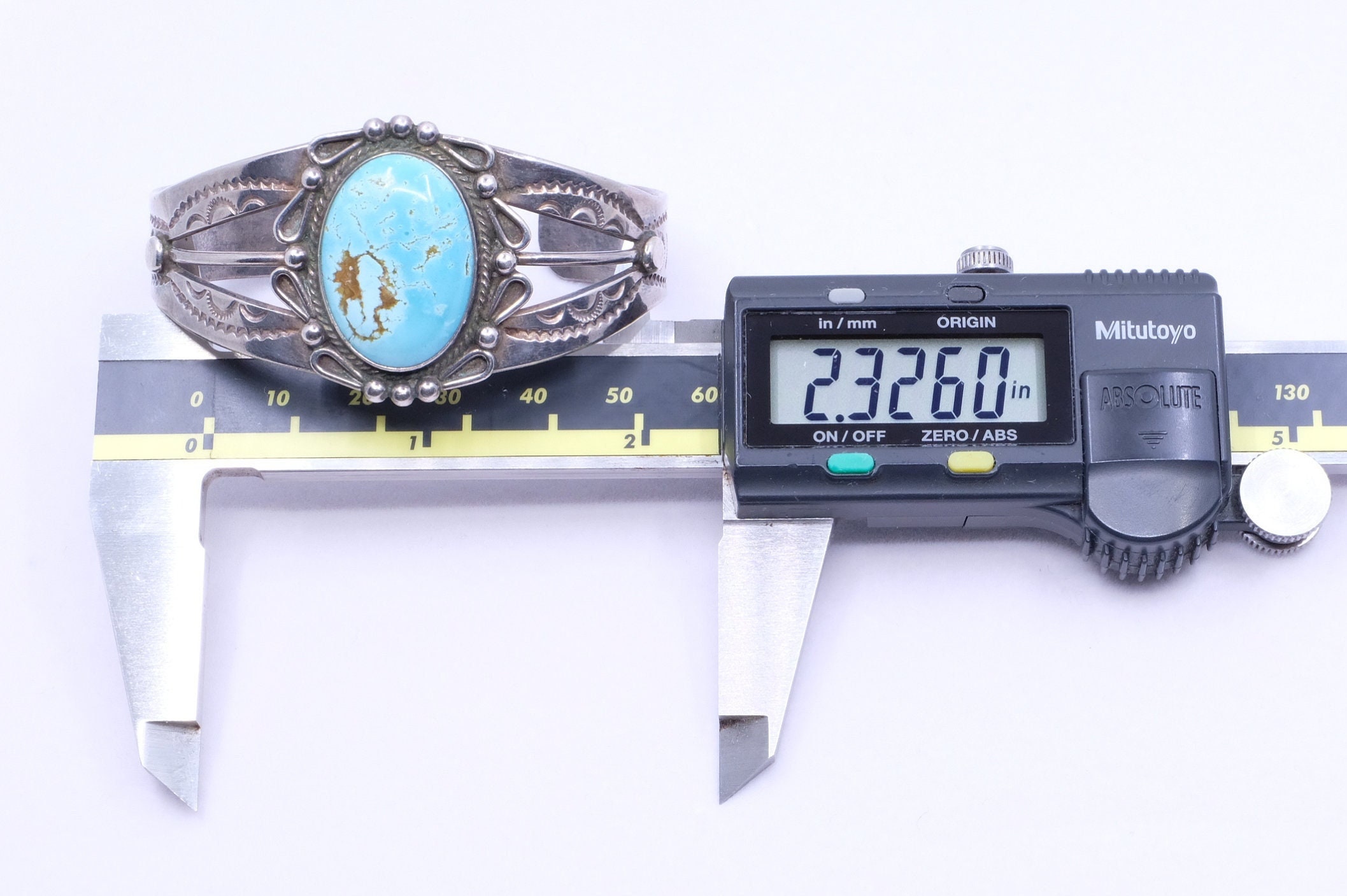
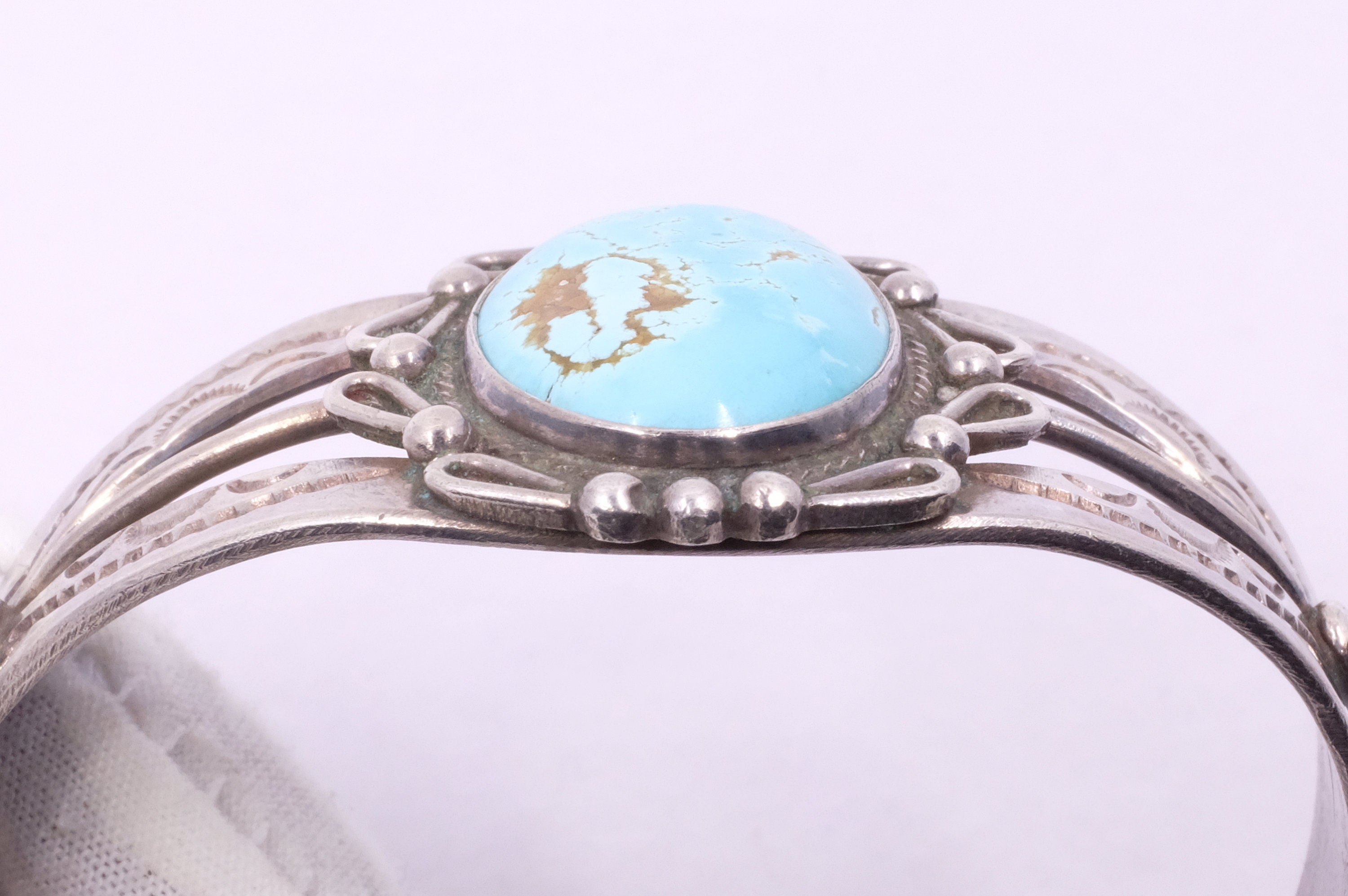
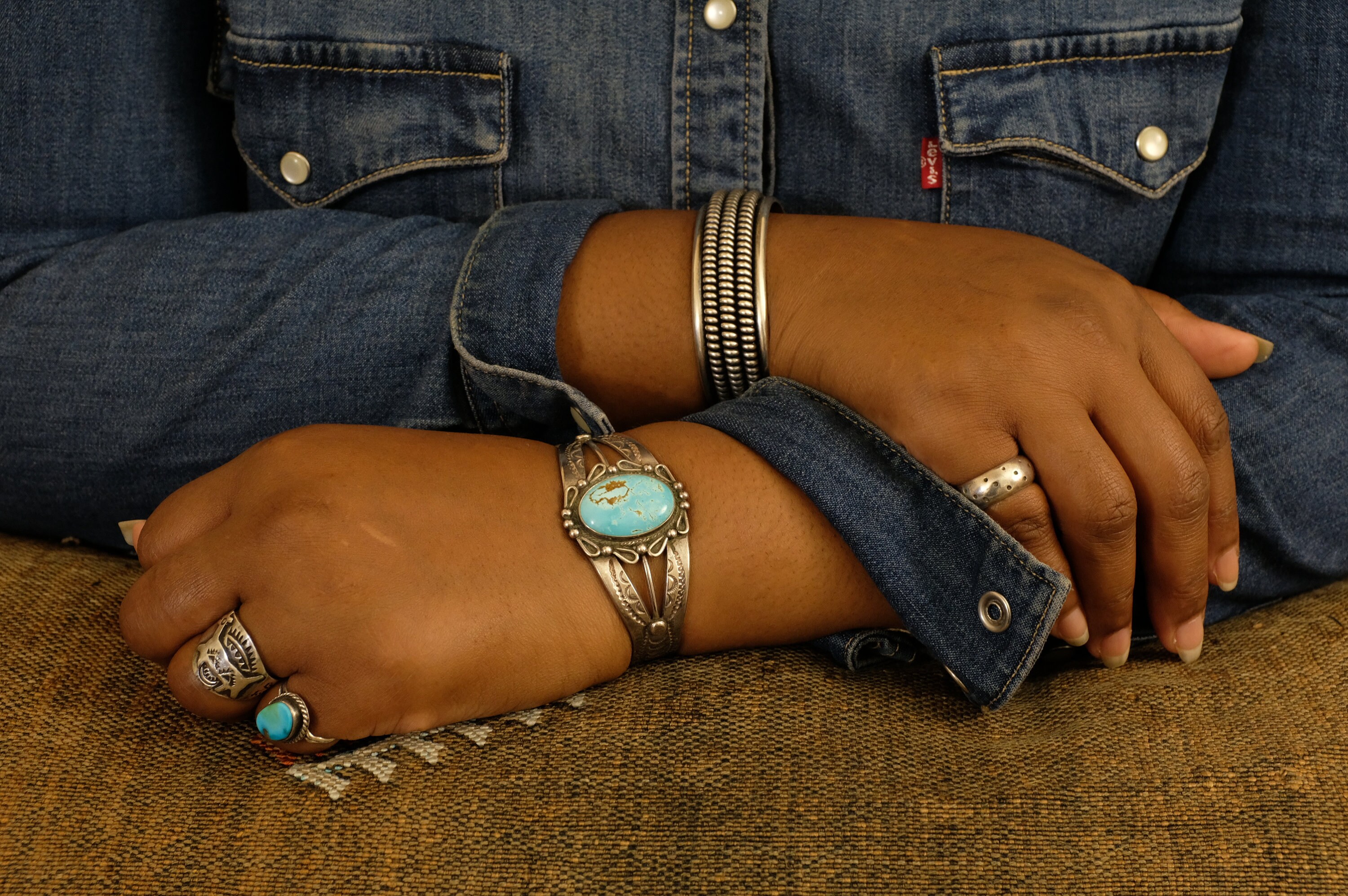
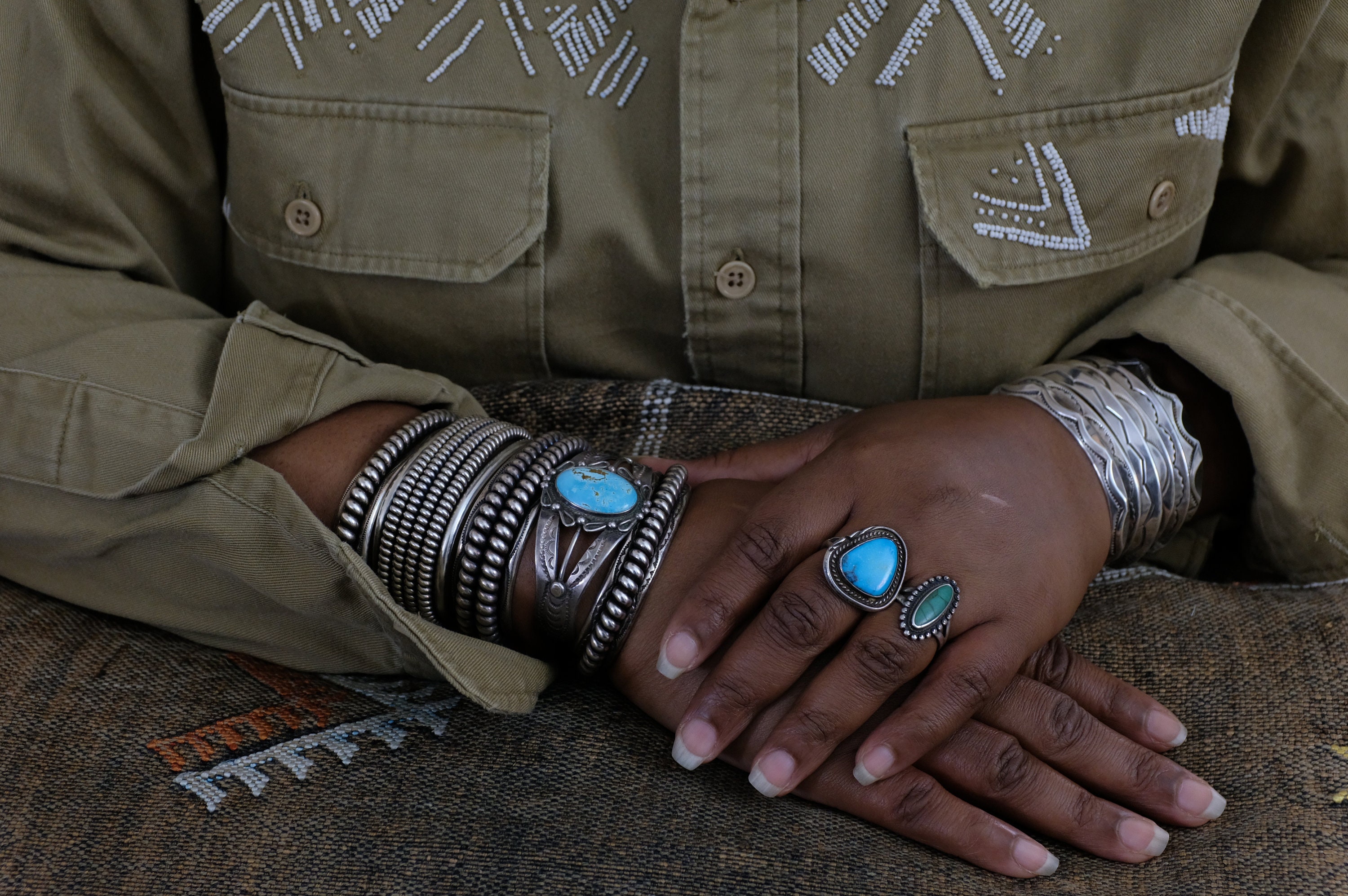
Sterling Silver Turquoise Fred Harvey Era Cuff Bracelet
$370.00
-
Details[Size]
Bracelet Length: 5.25 in.
Gap Width: 1 in.
Total Size: 6.25
This is a gorgeous late Fred Harvey-era turquoise cuff. That is a boring opening statement, but trying to think of a clever opening is eating me alive. I hate telling you that something is gorgeous because you obviously clicked on it, so what does that even mean in that context? You either think it’s so terrible that you want to know why anyone would offer such an abomination. Or you are already jazzed about the piece and telling you it’s gorgeous is like telling you that water is wet.
That’s the wacky part about writing copy. There’s a lot to say about this sterling silver cuff, but it depends on the audience. Because the audience is general, I end up having to repeat some parts in clever ways. For example, I called this piece a Fred Harvey Era cuff. But this may be lost on some parts of the audience. This is okay, but that means I would have to mention Fred Harvey, the Santa Fe Railroad, and the “opening” of the West to tourism. Then I’d have to backtrack and mention that this piece isn’t from the Fred Harvey Company, but that the “era” is really just a time where the cultural influences of the market meant that Native artists produced pieces that tourists and visitors wanted to buy -- which is a common theme in art. But then I’d get worried that I’m giving Fred Harvey too much credit. He didn’t invent the pieces, he just popularized them by selling them in his gift shops. But this wasn’t before enterprising Native folks were already selling their works at the train stations and near the hotels, anyway. But I don’t want to discredit him, as he had some insights and he’s half the reason “sterling” silver was used for these pieces instead of coin silver -- as sterling was the popular British standard and Fred Harvey was British.
Then I’d go on to mention the pieces’ influences. Native artisans weren’t unaware of the world around them nor devoid of influences and contact. This would be to emphasize that they were a sophisticated culture long before the railroad made its way into Native lands. I’d do that to make sure that I’m not coming across as paternalistic, which is something I read even in books on the matter. Cultures are dynamic and complex and though we’re willing to talk about the Renaissance as containing influences from Arabia, Spain, the ancient Greeks, and others, we tend to talk about Native cultures as if they weren’t trading with others, conducting business, and doing all of the cosmopolitan things everyone else on the planet were doing.
Then I’d have to find a way to close. Usually, I’d tie some idea from the point of the writing. It’s ye olde creative writing 101. This means I’d then have to edit some part of what I said above because it doesn’t help my point. But the editing then leads to missing ideas or points that’ll get removed from those sentences. But my endings for Fred Harvey Era-era pieces usually tie it back to American fashion. My point here is usually that Ralph Lauren does it, Madewell does it, and everyone else does it. So you get one of these pieces and be happy. But my idea here is to also buy newer pieces, as vintage pieces are a necessary part of any collection, while newer artists also have earned our patronage. Not out of charity, but because the work is some of the best silversmithing in the world -- given their long tradition of creating these works.
Then I’d wonder if it’s too long. Then I’d think to myself, “No, every piece requires folks to understand what, why, and where”. My thing is even if you don’t get it from me, you’ll at least walk away knowing what it is and why it is. Which, to me, outside of the thrill of someone getting something they love, is very important. -
Shipping & Policies
Shipping from United States
Processing time
1 business day
Customs and import taxes
Buyers are responsible for any customs and import taxes that may apply. I'm not responsible for delays due to customs.
Payment Options
Returns & Exchanges
I gladly accept returns, exchanges, and cancellations
Just contact me within: 30 days of delivery
Ship items back to me within: 45 days of delivery
Privacy policy
As an Etsy seller, I will not personally keep, sell, or store your information for any reason, whatsoever. Etsy has its own policies which explain its own consumer data management. You can read their Privacy Policy here: https://www.etsy.com/legal/privacy. As a fellow consumer, your privacy is of the utmost importance and will be maintained at the highest level possible.
Frequently Asked Questions
Gift wrapping and packaging
I carefully gift-wrap everything all of the time at no charge. If you buy 5 rings, I may place 3 in one box and 2 in another. If you're buying two or more items and select the 'Gift' option in your cart, I will pack each item in its own gift box or sack before placing them in the shipping box and sending them off.
If you have any questions or special requests, feel free to contact me. 🙂Sizing details
Always check photos and descriptions for size, weight, and other measurements. These are provided to ensure a great fit.📏
Care instructions
Generally, most items can be cleaned with a lint-free cloth.✨
Shipping - Signature
Some items may require a signature at delivery. Contact me if a signature isn't necessary.
If you want updates on your packages (Informed Delivery) as well as the option to sign for packages electronically by enrolling in USPS Electronic Signature Online/ eSOL, you may do so at the USPS website here: https://informeddelivery.usps.com/box/pages/intro/start.action
FAQs are here: https://faq.usps.com/s/article/USPS-Electronic-Signature-Online

